Failing victims, fuelling hate: challenging the harms of the 'Muslim grooming gangs' narrative Ella Cockbain and Waqas Tufail
Added on 2022-08-20
30 Pages18312 Words227 Views
Race & Class
Copyright © 2020 Institute of Race Relations, 1–30
10.1177/0306396819895727 journals.sagepub.com/home/rac
SAGE
Los Angeles,
London,
New Delhi,
Singapore,
Washington DC,
Melbourne
Failing victims, fuelling hate:
challenging the harms of the
‘Muslim grooming gangs’ narrative
ELLA CoCkbAIN and WAqAS TufAIL
Abstract: ‘Muslim grooming gangs’ have become a defining feature of media,
political and public debate around child sexual exploitation in the uk. The
dominant narrative that has emerged to explain a series of horrific cases is
misleading, sensationalist and has in itself promoted a number of harms. This
article examines how racist framings of ‘Muslim grooming gangs’ exist not
only in extremist, far-right fringes but in mainstream, liberal discourses too.
The involvement of supposedly feminist and liberal actors and the promotion
of pseudoscientific ‘research’ have lent a veneer of legitimacy to essentialist,
Ella Cockbain is an associate professor at university College London in the Department of Security
and Crime Science and a visiting research fellow at Leiden university. Her research focuses on
human trafficking, child sexual exploitation and labour exploitation. In seeking evidence-
informed responses to complex issues, she has worked closely with organisations across the
public, private and third sectors. Her book Offender and Victim Networks in Human Trafficking was
published by Routledge in 2018.
Waqas Tufail is a senior lecturer in Criminology at Leeds beckett university. His research interests
concern the policing, racialisation and criminalisation of marginalised and minority communities
and the lived experiences of Muslim minorities. He is a board member of the International
Sociological Association Research Committee on Racism, Nationalism, Indigeneity and Ethnicity,
serves on the editorial board of Sociology of Race and Ethnicity and is co-editor of Media, Crime,
Racism (Palgrave Macmillan, 2018).
895727RAC0010.1177/0306396819895727Race&ClassCockbainandTufailresearch-article2020
Copyright © 2020 Institute of Race Relations, 1–30
10.1177/0306396819895727 journals.sagepub.com/home/rac
SAGE
Los Angeles,
London,
New Delhi,
Singapore,
Washington DC,
Melbourne
Failing victims, fuelling hate:
challenging the harms of the
‘Muslim grooming gangs’ narrative
ELLA CoCkbAIN and WAqAS TufAIL
Abstract: ‘Muslim grooming gangs’ have become a defining feature of media,
political and public debate around child sexual exploitation in the uk. The
dominant narrative that has emerged to explain a series of horrific cases is
misleading, sensationalist and has in itself promoted a number of harms. This
article examines how racist framings of ‘Muslim grooming gangs’ exist not
only in extremist, far-right fringes but in mainstream, liberal discourses too.
The involvement of supposedly feminist and liberal actors and the promotion
of pseudoscientific ‘research’ have lent a veneer of legitimacy to essentialist,
Ella Cockbain is an associate professor at university College London in the Department of Security
and Crime Science and a visiting research fellow at Leiden university. Her research focuses on
human trafficking, child sexual exploitation and labour exploitation. In seeking evidence-
informed responses to complex issues, she has worked closely with organisations across the
public, private and third sectors. Her book Offender and Victim Networks in Human Trafficking was
published by Routledge in 2018.
Waqas Tufail is a senior lecturer in Criminology at Leeds beckett university. His research interests
concern the policing, racialisation and criminalisation of marginalised and minority communities
and the lived experiences of Muslim minorities. He is a board member of the International
Sociological Association Research Committee on Racism, Nationalism, Indigeneity and Ethnicity,
serves on the editorial board of Sociology of Race and Ethnicity and is co-editor of Media, Crime,
Racism (Palgrave Macmillan, 2018).
895727RAC0010.1177/0306396819895727Race&ClassCockbainandTufailresearch-article2020
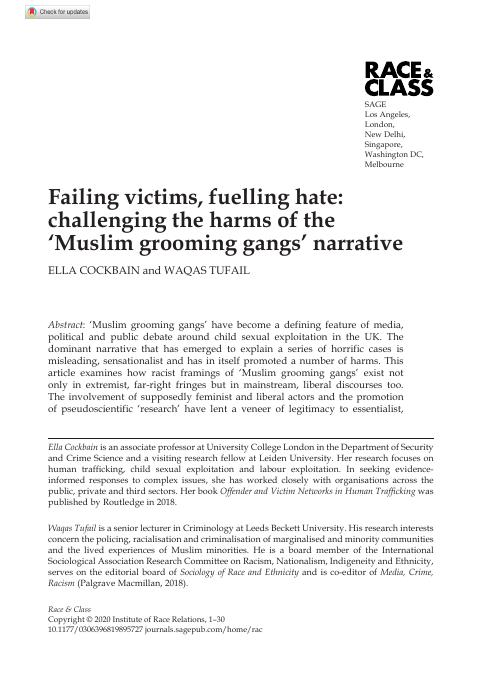
2 Race & Class 00(0)
orientalist stereotypes of Muslim men, the demonisation of whole communities
and demands for collective responsibility. These developments are situated in
the broader socio-political context, including the far Right’s weaponisation of
women’s rights, the ‘Islamophobia industry’ and a long history of racialising crime.
We propose alternative ways of understanding and responding to child sexual
exploitation/abuse. We contend that genuinely anti-racist feminist approaches
can help in centring victims/survivors and their needs and in tackling serious
sexual violence without demonising entire communities.
Keywords: anti-Muslim racism, anti-racist feminism, child sexual abuse and
exploitation, grooming gangs, Islamophobia, quilliam
Introduction
over the past decade, the ‘Muslim grooming gangs’ narrative has become firmly
established in popular and political discourse in the uk. Claims of how Muslim
culture and faith supposedly perpetuate sexual abuse have helped collectively
demonise british Muslim communities, especially young Muslim men. Initially
driven by the rightwing media, this construction has been advanced and legiti-
mised by ostensibly liberal and feminist actors. Additional boosts have come via
discredited, highly-politicised and partisan ‘research’ from special interest
groups, apparently seeking to capitalise on wider anti-Muslim attitudes in order
to influence government policy and otherwise profit. The ‘Muslim grooming
gangs’ trope has enduring currency among rightwing and liberal political elites
and, if left unchecked, risks fuelling further racialised and alarmist news cover-
age and informing misguided and harmful responses. Much of the narrative has
centred around towns in the North and Midlands regions of England, where
many particularly high-profile criminal convictions have taken place. Rotherham,
in South Yorkshire, has arguably become the place most synonymous with
‘Muslim grooming gangs’ and has attracted the most attention from far-right
groups. Home to a significant population of Asian Muslim heritage, workers
from the Indian subcontinent initially arrived into towns such as Rotherham to
work within the manufacturing sector and were often treated poorly in compari-
son to whites.1 Like many other places in the former industrial heartlands in the
North, Rotherham has struggled for decades with the effects of deindustrialisa-
tion – the loss of skilled, well-paid jobs, soaring unemployment and the destabili-
sation and fragmentation of communities.2
The central argument of the ‘grooming gangs’ narrative is, in short, that a ‘dis-
proportionate’ number of Asian/Muslim/Pakistani-heritage men are involved in
grooming (mostly) white british girls for organised sexual abuse. These claims are
often substantiated with reference to a spate of high-profile prosecutions of so-
called ‘grooming gangs’ in towns and cities such as Rotherham, Rochdale, Derby,
Telford, oxford, Huddersfield and Newcastle. The offenders in question – and
orientalist stereotypes of Muslim men, the demonisation of whole communities
and demands for collective responsibility. These developments are situated in
the broader socio-political context, including the far Right’s weaponisation of
women’s rights, the ‘Islamophobia industry’ and a long history of racialising crime.
We propose alternative ways of understanding and responding to child sexual
exploitation/abuse. We contend that genuinely anti-racist feminist approaches
can help in centring victims/survivors and their needs and in tackling serious
sexual violence without demonising entire communities.
Keywords: anti-Muslim racism, anti-racist feminism, child sexual abuse and
exploitation, grooming gangs, Islamophobia, quilliam
Introduction
over the past decade, the ‘Muslim grooming gangs’ narrative has become firmly
established in popular and political discourse in the uk. Claims of how Muslim
culture and faith supposedly perpetuate sexual abuse have helped collectively
demonise british Muslim communities, especially young Muslim men. Initially
driven by the rightwing media, this construction has been advanced and legiti-
mised by ostensibly liberal and feminist actors. Additional boosts have come via
discredited, highly-politicised and partisan ‘research’ from special interest
groups, apparently seeking to capitalise on wider anti-Muslim attitudes in order
to influence government policy and otherwise profit. The ‘Muslim grooming
gangs’ trope has enduring currency among rightwing and liberal political elites
and, if left unchecked, risks fuelling further racialised and alarmist news cover-
age and informing misguided and harmful responses. Much of the narrative has
centred around towns in the North and Midlands regions of England, where
many particularly high-profile criminal convictions have taken place. Rotherham,
in South Yorkshire, has arguably become the place most synonymous with
‘Muslim grooming gangs’ and has attracted the most attention from far-right
groups. Home to a significant population of Asian Muslim heritage, workers
from the Indian subcontinent initially arrived into towns such as Rotherham to
work within the manufacturing sector and were often treated poorly in compari-
son to whites.1 Like many other places in the former industrial heartlands in the
North, Rotherham has struggled for decades with the effects of deindustrialisa-
tion – the loss of skilled, well-paid jobs, soaring unemployment and the destabili-
sation and fragmentation of communities.2
The central argument of the ‘grooming gangs’ narrative is, in short, that a ‘dis-
proportionate’ number of Asian/Muslim/Pakistani-heritage men are involved in
grooming (mostly) white british girls for organised sexual abuse. These claims are
often substantiated with reference to a spate of high-profile prosecutions of so-
called ‘grooming gangs’ in towns and cities such as Rotherham, Rochdale, Derby,
Telford, oxford, Huddersfield and Newcastle. The offenders in question – and
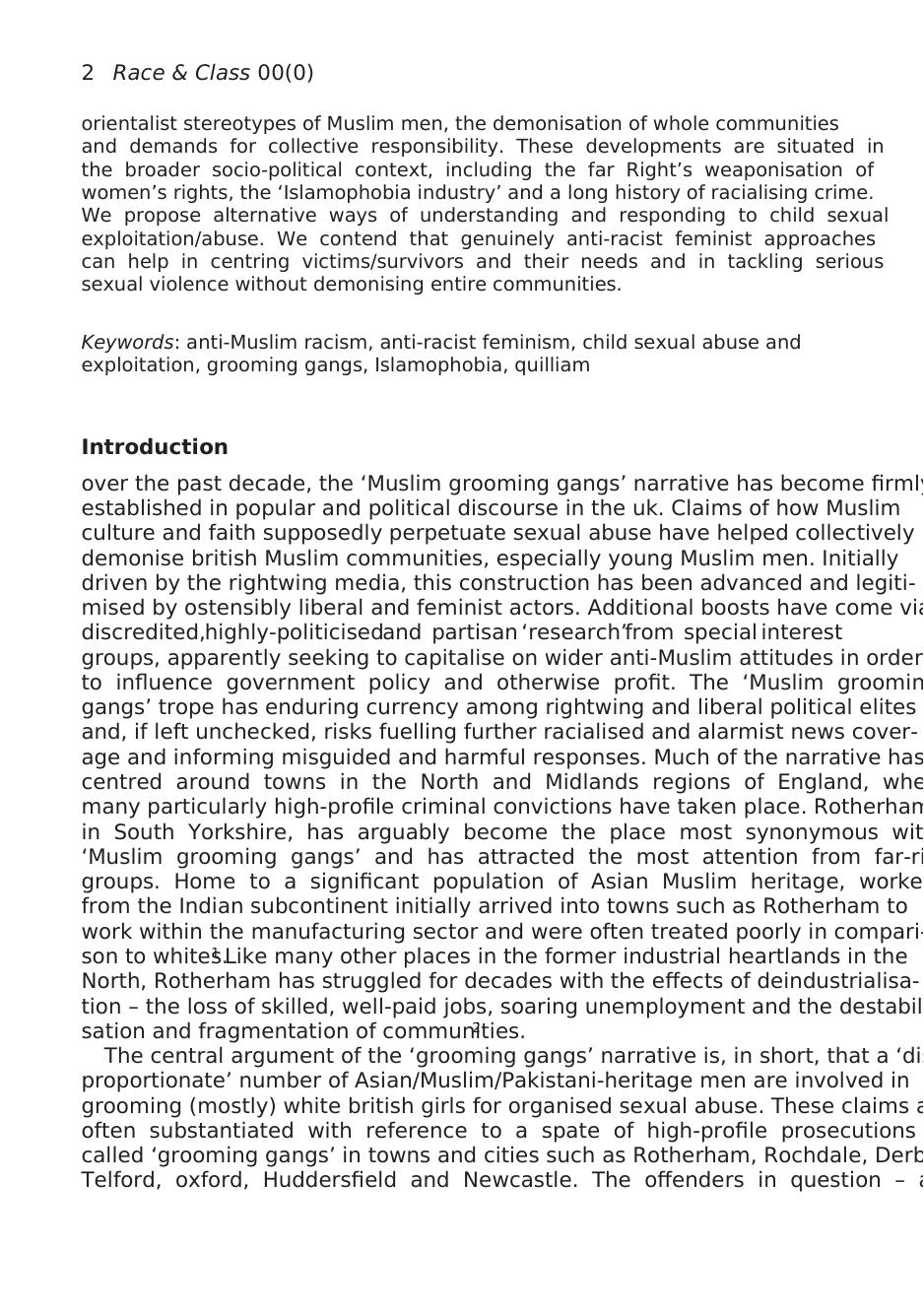
Cockbain and Tufail: Failing victims, fuelling hate 3
undoubtedly many more – have absolutely committed horrific crimes; this article is
categorically not about denying their existence, belittling their harms or otherwise
excusing the inexcusable. The term ‘grooming gangs’, however, is itself a spurious
media construct and one that has been heavily racialised from the very start.3
‘Grooming gangs’ simply do not correspond to established legal or social scientific
categories and the various weak definitions offered up by proponents of this
racialised narrative fail to delineate these offenders meaningfully from other groups
of child sex offenders.4 Contrary to stereotypes, there is no ‘grooming’ offence5 – let
alone a ‘grooming gangs’ offence; consequently, ‘grooming gang offenders’ cannot
be sensibly disentangled from police recorded crime data or prosecution data.
Moreover, and as will be shown later, a relatively small number of high-profile
‘grooming gangs’ cases have been used to claim an ‘epidemic’ of abuse. Despite
routinely (and wrongly) being depicted as a ‘specific’ crime type, ‘grooming gangs’
are better understood as a vaguely and inconsistently defined subset of child sex-
ual exploitation (CSE) offenders.6 Complicating matters further, however, CSE is
itself a poorly delineated subset of child sexual abuse (CSA) that spans diverse
criminal offences (e.g. rape, sexual activity with a child) – most of which are also
used in instances that would not normally be considered CSE.7 Existing data sim-
ply do not enable reliable assessments of the prevalence or correlates of CSE,8 let
alone those of ‘grooming gangs’ – so claims of ethnic or religious disproportional-
ity in ‘grooming gangs’ are just not testable in any meaningful sense.9
The ‘grooming gangs’ narrative belongs within a broader tendency to racialise
crime in political and popular discourse. The classic example is the racialised panic
in 1970s britain in which young black men were cast as ‘muggers’.10 fuelled by
misleading statistics and misinformation, the devastating consequences included
over-policing and criminalisation. In the uS, the term ‘superpredator’ emerged in
the 1990s, pushed forward by conservative thinkers as representing a new, hyper-
violent crime phenomenon.11 As Yamahtta-Taylor reminds us, the use of this term
by former Secretary of State and former presidential candidate Hilary Clinton
played directly into racist, damaging tropes about young black men: ‘The discourse
of “super predators” was not an unfortunate misstatement; it was a racist, political
calculation intended to publicly demonstrate a lack of sympathy for black people
and support for a regime of punishment and retribution.’12
The racialisation of ‘grooming gangs’ must also be understood in the context of
a long history of racialised and gendered Islamophobia, or anti-Muslim racism.
Muslim men have been stereotyped as both religiously fanatical and prone to
committing violent, sexual acts motivated by a patriarchal, misogynistic culture
and backward, barbaric religion. 13 Looking back over more than a decade, we
document the architects of the ‘grooming gangs’ narrative, examine the political
backdrop to it and consider the harms it causes. We also sketch out tangible ways
forward, with implications for policy-makers, practitioners and activists. We con-
tend that genuinely practised anti-racist feminism is vital in tackling child sexual
abuse and resisting anti-Muslim forces.
undoubtedly many more – have absolutely committed horrific crimes; this article is
categorically not about denying their existence, belittling their harms or otherwise
excusing the inexcusable. The term ‘grooming gangs’, however, is itself a spurious
media construct and one that has been heavily racialised from the very start.3
‘Grooming gangs’ simply do not correspond to established legal or social scientific
categories and the various weak definitions offered up by proponents of this
racialised narrative fail to delineate these offenders meaningfully from other groups
of child sex offenders.4 Contrary to stereotypes, there is no ‘grooming’ offence5 – let
alone a ‘grooming gangs’ offence; consequently, ‘grooming gang offenders’ cannot
be sensibly disentangled from police recorded crime data or prosecution data.
Moreover, and as will be shown later, a relatively small number of high-profile
‘grooming gangs’ cases have been used to claim an ‘epidemic’ of abuse. Despite
routinely (and wrongly) being depicted as a ‘specific’ crime type, ‘grooming gangs’
are better understood as a vaguely and inconsistently defined subset of child sex-
ual exploitation (CSE) offenders.6 Complicating matters further, however, CSE is
itself a poorly delineated subset of child sexual abuse (CSA) that spans diverse
criminal offences (e.g. rape, sexual activity with a child) – most of which are also
used in instances that would not normally be considered CSE.7 Existing data sim-
ply do not enable reliable assessments of the prevalence or correlates of CSE,8 let
alone those of ‘grooming gangs’ – so claims of ethnic or religious disproportional-
ity in ‘grooming gangs’ are just not testable in any meaningful sense.9
The ‘grooming gangs’ narrative belongs within a broader tendency to racialise
crime in political and popular discourse. The classic example is the racialised panic
in 1970s britain in which young black men were cast as ‘muggers’.10 fuelled by
misleading statistics and misinformation, the devastating consequences included
over-policing and criminalisation. In the uS, the term ‘superpredator’ emerged in
the 1990s, pushed forward by conservative thinkers as representing a new, hyper-
violent crime phenomenon.11 As Yamahtta-Taylor reminds us, the use of this term
by former Secretary of State and former presidential candidate Hilary Clinton
played directly into racist, damaging tropes about young black men: ‘The discourse
of “super predators” was not an unfortunate misstatement; it was a racist, political
calculation intended to publicly demonstrate a lack of sympathy for black people
and support for a regime of punishment and retribution.’12
The racialisation of ‘grooming gangs’ must also be understood in the context of
a long history of racialised and gendered Islamophobia, or anti-Muslim racism.
Muslim men have been stereotyped as both religiously fanatical and prone to
committing violent, sexual acts motivated by a patriarchal, misogynistic culture
and backward, barbaric religion. 13 Looking back over more than a decade, we
document the architects of the ‘grooming gangs’ narrative, examine the political
backdrop to it and consider the harms it causes. We also sketch out tangible ways
forward, with implications for policy-makers, practitioners and activists. We con-
tend that genuinely practised anti-racist feminism is vital in tackling child sexual
abuse and resisting anti-Muslim forces.
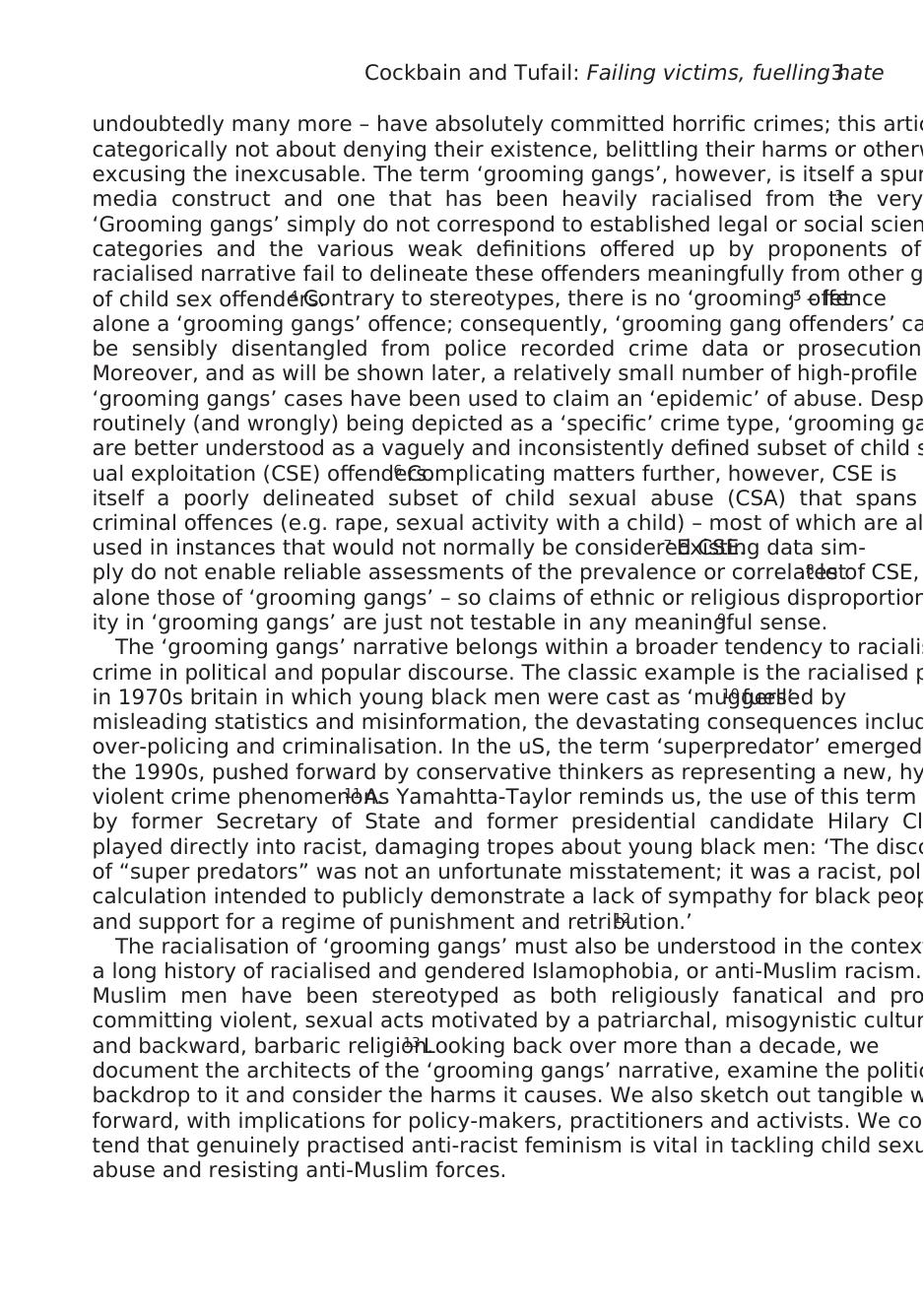
4 Race & Class 00(0)
Introducing the key architects of the ‘grooming gangs’ narrative
Here, we consider how racialised discourse around ‘Asian sex gangs’ and
‘Muslim rape gangs’ emerged, proliferated and became entrenched. We focus
on four main architects: media, politicians, the far Right and dubious ‘special
interest groups’.
The media creates, spreads and sustains a toxic narrative
‘on-street grooming’ exploded into the national consciousness on 5 January
2011 when The Times – a rightwing broadsheet owned by Murdoch’s News
International – ran a dramatic exposé claiming to have uncovered a new crime
threat. Setting the bar for subsequent debate, evidence of just fifty-six convicted
offenders was used to substantiate alarmist claims of a ‘tidal wave of offend-
ing’. 14 The story combined two particularly explosive contentions: that Pakistani-
heritage men were preying on white british girls; and that the authorities failed
to intervene ‘for fear of being branded racist’. 15 The Times’ portrayal of ‘groom-
ing’ as a distinct and racialised crime threat rests on ‘misconceptions, anecdote,
opinion and the deliberate manipulation of limited statistics of dubious prove-
nance’. 16 Nevertheless, the coverage proved inflammatory and has set the news
agenda in the decade since.
The journalist behind the story was a little-known regional correspondent
called Andrew Norfolk. Soon promoted to The Times’ Chief Investigative Reporter,
Norfolk pursued ‘grooming’-related stories doggedly over the coming years,
combining major scoops with less obviously newsworthy stories seemingly cho-
sen to stoke ‘his personally crafted crime model of white victims and Pakistani
perpetrators’.17 He subsequently received some of the most prestigious awards in
british journalism, including the orwell Prize and Paul foot Award. A series of
discredited articles led Cathcart and french to examine whether Norfolk was sac-
rificing journalistic standards in a push to present ‘Muslims as threatening’.18
Their rigorous analysis of three major stories – two ‘grooming’-related and the
now infamous ‘Muslim foster care’19 scandal – concluded that his central allega-
tions were ‘unfounded’, ‘serious inaccuracies’ rife, ‘standards of conduct and eth-
ics’ severely breached and ‘Norfolk’s impartiality’ highly questionable. 20 Editor
John Witherow was complicit too, they argued, as the newspaper had ‘vigorously
promoted Norfolk’s accusations, placing them on its front page, endorsing them
in editorials and subsequently resisting complaints and criticisms in defiance of
the evidence’.21 Maintaining this trend, The Times dismissed the forensic critique
as a ‘politically motivated’ attempt to ‘smear and suppress fine reporting’.22
His dubious journalistic standards notwithstanding, Norfolk’s racialised crime
threat immediately caught the media, political and public imagination and soon
became entrenched.23 Phrases like ‘grooming gang’ have come to assume a par-
ticular and racially loaded meaning. Even a cursory news database search dem-
onstrates how a new vocabulary emerged post-Times exposé: the term ‘grooming
Introducing the key architects of the ‘grooming gangs’ narrative
Here, we consider how racialised discourse around ‘Asian sex gangs’ and
‘Muslim rape gangs’ emerged, proliferated and became entrenched. We focus
on four main architects: media, politicians, the far Right and dubious ‘special
interest groups’.
The media creates, spreads and sustains a toxic narrative
‘on-street grooming’ exploded into the national consciousness on 5 January
2011 when The Times – a rightwing broadsheet owned by Murdoch’s News
International – ran a dramatic exposé claiming to have uncovered a new crime
threat. Setting the bar for subsequent debate, evidence of just fifty-six convicted
offenders was used to substantiate alarmist claims of a ‘tidal wave of offend-
ing’. 14 The story combined two particularly explosive contentions: that Pakistani-
heritage men were preying on white british girls; and that the authorities failed
to intervene ‘for fear of being branded racist’. 15 The Times’ portrayal of ‘groom-
ing’ as a distinct and racialised crime threat rests on ‘misconceptions, anecdote,
opinion and the deliberate manipulation of limited statistics of dubious prove-
nance’. 16 Nevertheless, the coverage proved inflammatory and has set the news
agenda in the decade since.
The journalist behind the story was a little-known regional correspondent
called Andrew Norfolk. Soon promoted to The Times’ Chief Investigative Reporter,
Norfolk pursued ‘grooming’-related stories doggedly over the coming years,
combining major scoops with less obviously newsworthy stories seemingly cho-
sen to stoke ‘his personally crafted crime model of white victims and Pakistani
perpetrators’.17 He subsequently received some of the most prestigious awards in
british journalism, including the orwell Prize and Paul foot Award. A series of
discredited articles led Cathcart and french to examine whether Norfolk was sac-
rificing journalistic standards in a push to present ‘Muslims as threatening’.18
Their rigorous analysis of three major stories – two ‘grooming’-related and the
now infamous ‘Muslim foster care’19 scandal – concluded that his central allega-
tions were ‘unfounded’, ‘serious inaccuracies’ rife, ‘standards of conduct and eth-
ics’ severely breached and ‘Norfolk’s impartiality’ highly questionable. 20 Editor
John Witherow was complicit too, they argued, as the newspaper had ‘vigorously
promoted Norfolk’s accusations, placing them on its front page, endorsing them
in editorials and subsequently resisting complaints and criticisms in defiance of
the evidence’.21 Maintaining this trend, The Times dismissed the forensic critique
as a ‘politically motivated’ attempt to ‘smear and suppress fine reporting’.22
His dubious journalistic standards notwithstanding, Norfolk’s racialised crime
threat immediately caught the media, political and public imagination and soon
became entrenched.23 Phrases like ‘grooming gang’ have come to assume a par-
ticular and racially loaded meaning. Even a cursory news database search dem-
onstrates how a new vocabulary emerged post-Times exposé: the term ‘grooming
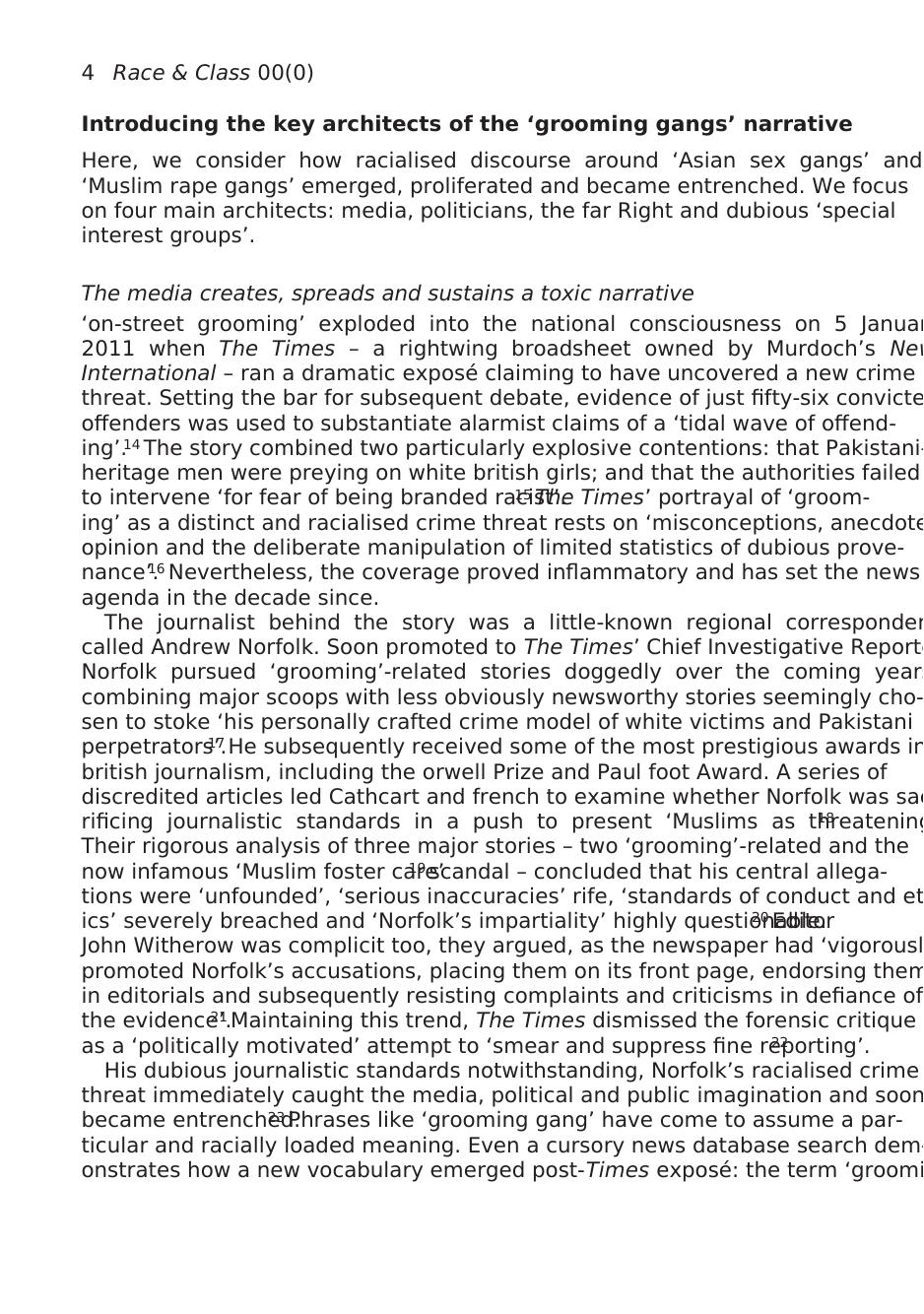
Cockbain and Tufail: Failing victims, fuelling hate 5
gang*’ returned 5,647 results in the nearly nine years since then, compared with
zero in the nine years prior. 24 The term’s racialisation was as evident as its prolif-
eration: over half the results contained references to ‘Islam*’, ‘Muslim*’, ‘Pakistan*’
or ‘Asian*’.25 Indicating how this loaded language has leached even into profes-
sional discourse, the Crown Prosecution Service (CPS) recently issued a press
release headlined ‘Six men convicted of Rotherham grooming gang offences’: to
reiterate, ‘grooming gang offences’ do not exist in law. 26
Several academics have criticised the disparity between media portrayals of
‘Asian sex gangs’ and similarly high-profile white offenders, including celebrities
and politicians. 27 According to Miah, 28 sexual abuses carried out by Asian offend-
ers are explained in terms of race and culture, whereas their white counterparts’
crimes are framed as individual deviance.
Politicians give credibility to racial stereotypes around ‘grooming’
Numerous mainstream politicians have helped propagate the ‘grooming gangs’
narrative through clumsy, misleading and/or outright racist contributions.
Centre-left politicians have proved particularly pivotal in migrating rhetoric
more characteristic of the far Right to the political mainstream.29 key early contri-
butions came from Labour MP Jack Straw: despite apparent disinterest in CSE
while home secretary, ahead of a critical by-election he notoriously blamed
‘grooming’ on regressive british-Pakistani culture, arranged marriages and views
of white girls as ‘easy meat’.30 His comments not only farcically implied that rap-
ing children is the natural alternative to premarital sex 31 but furthered myths that
‘repressed sexuality’ drives abuse and perpetrated orientalist stereotypes about
Muslim men’s ‘rapacious sexual appetites’.32 other Labour politicians followed
suit in emphasising the role of ethnicity and/or culture. 33 Such spurious ‘cultural’
explanations have been criticised both within and beyond the context of CSE as a
backdoor for ‘new racism’ in a supposedly ‘post-racial’ society.34
one particularly dramatic intervention came from Sarah Champion, Labour MP
for Rotherham and, ironically, shadow secretary of state for women and equalities.
Champion had to resign from the frontbench after writing an inflammatory article
entitled ‘british Pakistani men ARE raping and exploiting white girls . . . and it’s
time we faced up to it’ for The Sun, a News International-owned rightwing tabloid.35
Champion wrote, ‘These people are predators, and the common denominator is
their ethnic heritage’, claiming she was speaking out as she could no longer ‘shy
away from doing the right thing by fearing being called a racist’. Her views in this
article were likened to those of the far Right, and she faced intense criticism includ-
ing from some of her parliamentary colleagues and from local human rights groups
in her Rotherham constituency.36 Champion later apologised for her ‘extremely
poor choice of words’, admitting the article ‘could be taken to vilify an entire com-
munity’.37 Her article notably appeared alongside and was endorsed by a column
from The Sun’s former political editor Trevor kavanagh, which characterised
‘grooming gangs’ as ‘the Muslim problem’: a framing heavily criticised for evoking
gang*’ returned 5,647 results in the nearly nine years since then, compared with
zero in the nine years prior. 24 The term’s racialisation was as evident as its prolif-
eration: over half the results contained references to ‘Islam*’, ‘Muslim*’, ‘Pakistan*’
or ‘Asian*’.25 Indicating how this loaded language has leached even into profes-
sional discourse, the Crown Prosecution Service (CPS) recently issued a press
release headlined ‘Six men convicted of Rotherham grooming gang offences’: to
reiterate, ‘grooming gang offences’ do not exist in law. 26
Several academics have criticised the disparity between media portrayals of
‘Asian sex gangs’ and similarly high-profile white offenders, including celebrities
and politicians. 27 According to Miah, 28 sexual abuses carried out by Asian offend-
ers are explained in terms of race and culture, whereas their white counterparts’
crimes are framed as individual deviance.
Politicians give credibility to racial stereotypes around ‘grooming’
Numerous mainstream politicians have helped propagate the ‘grooming gangs’
narrative through clumsy, misleading and/or outright racist contributions.
Centre-left politicians have proved particularly pivotal in migrating rhetoric
more characteristic of the far Right to the political mainstream.29 key early contri-
butions came from Labour MP Jack Straw: despite apparent disinterest in CSE
while home secretary, ahead of a critical by-election he notoriously blamed
‘grooming’ on regressive british-Pakistani culture, arranged marriages and views
of white girls as ‘easy meat’.30 His comments not only farcically implied that rap-
ing children is the natural alternative to premarital sex 31 but furthered myths that
‘repressed sexuality’ drives abuse and perpetrated orientalist stereotypes about
Muslim men’s ‘rapacious sexual appetites’.32 other Labour politicians followed
suit in emphasising the role of ethnicity and/or culture. 33 Such spurious ‘cultural’
explanations have been criticised both within and beyond the context of CSE as a
backdoor for ‘new racism’ in a supposedly ‘post-racial’ society.34
one particularly dramatic intervention came from Sarah Champion, Labour MP
for Rotherham and, ironically, shadow secretary of state for women and equalities.
Champion had to resign from the frontbench after writing an inflammatory article
entitled ‘british Pakistani men ARE raping and exploiting white girls . . . and it’s
time we faced up to it’ for The Sun, a News International-owned rightwing tabloid.35
Champion wrote, ‘These people are predators, and the common denominator is
their ethnic heritage’, claiming she was speaking out as she could no longer ‘shy
away from doing the right thing by fearing being called a racist’. Her views in this
article were likened to those of the far Right, and she faced intense criticism includ-
ing from some of her parliamentary colleagues and from local human rights groups
in her Rotherham constituency.36 Champion later apologised for her ‘extremely
poor choice of words’, admitting the article ‘could be taken to vilify an entire com-
munity’.37 Her article notably appeared alongside and was endorsed by a column
from The Sun’s former political editor Trevor kavanagh, which characterised
‘grooming gangs’ as ‘the Muslim problem’: a framing heavily criticised for evoking
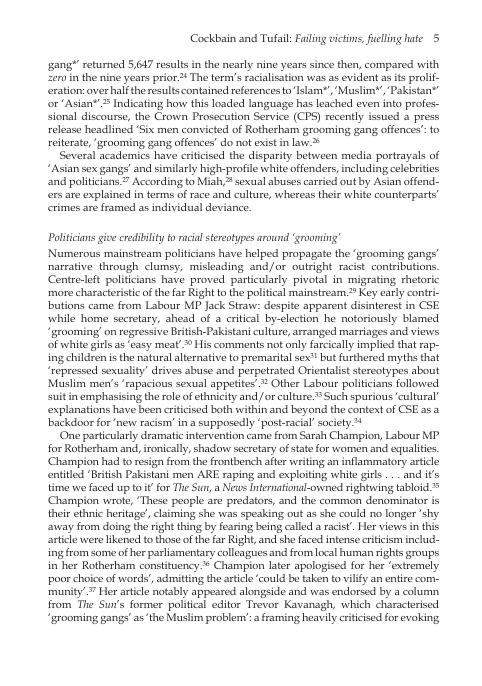
6 Race & Class 00(0)
Nazi-era rhetoric.38 kavanagh’s article attracted official complaints but was cleared
by the Independent Press Standards organisation (IPSo), which found it did not
breach its guidelines. kavanagh serves as a member of IPSo’s regulatory board,
although the body claimed he was not part of the investigation. The decision to
clear kavanagh’s article was condemned by both the Muslim Council of britain
and the board of Deputies of british Jews, which said the decision highlighted that
IPSo was ‘unfit for purpose’.39
Conservative MP Sajid Javid, then communities secretary and now chancellor
of the exchequer, vocally defended Champion’s contribution and the need to
examine ‘racial motivation’.40 The following year, Champion spearheaded a let-
ter41 to Javid – by then home secretary – co-signed by twenty MPs, demanding
research into the ‘drivers’ of ‘organised grooming gangs’.42 The letter explicitly
mentioned neither race nor religion, but by now ‘grooming gangs’ was clearly a
racially coded term. An interfaith group’s follow-up letter supported Champion’s
demands, explicitly citing dubious evidence of ethnic disproportionality to bolster
claims of a ‘sexual grooming gang epidemic’.43 Javid’s response to Champion was
scooped by The Times’ aforementioned Andrew Norfolk and reported as the home
secretary having ‘ordered research into why men convicted of grooming-gang sex
crimes are disproportionately of Pakistani origin’.44 Although this angle misrepre-
sented Javid’s actual letter, it was repeated across numerous news outlets – and
neither Javid nor Champion apparently cared to correct it.45 Consequently, the
impression stood that ethnic disproportionality in ‘grooming gangs’ was an
accepted fact and legitimate focus for government-commissioned research.
fuelling the fire, Javid later released a dog-whistle of a tweet about ‘sick Asian
paedophiles’. 46 His propagation of racial stereotypes is particularly important
given his senior roles and british-Pakistani heritage: ‘racial gatekeeping’ lends
social legitimacy to claims and policies that disadvantage racially marginalised
groups. 47 Notably, Javid’s interest in racialising sexual offending has not extended
to organised abuse in schools, religious institutions, sports clubs, politics, celeb-
rity circles and other contexts likely dominated by white offenders. Contributions
to a recent House of Lords debate exemplify how politicians continue to stoke
misleading narratives around ‘grooming gangs’, perhaps to further broader
agendas of their own. Lord Singh, an independent peer who soon after quit the
bbC over claims it was trying to silence him for fear of offending Muslims, 48
decried ‘misplaced political correctness’. baroness Cox, who previously lost the
Conservative whip after urging voters to support ukIP,49 appealed to collective
responsibility, saying ‘Muslim leaders’ should ‘take ownership of policies to pre-
vent these atrocities’. Lord Cormack exceptionalised ‘grooming gangs’, treating
them as emblematic of an entire community:
. . . it is deeply distressing that these people are disgracing themselves and
their wider community, as well as the british community of which they have
become a part. 50
Nazi-era rhetoric.38 kavanagh’s article attracted official complaints but was cleared
by the Independent Press Standards organisation (IPSo), which found it did not
breach its guidelines. kavanagh serves as a member of IPSo’s regulatory board,
although the body claimed he was not part of the investigation. The decision to
clear kavanagh’s article was condemned by both the Muslim Council of britain
and the board of Deputies of british Jews, which said the decision highlighted that
IPSo was ‘unfit for purpose’.39
Conservative MP Sajid Javid, then communities secretary and now chancellor
of the exchequer, vocally defended Champion’s contribution and the need to
examine ‘racial motivation’.40 The following year, Champion spearheaded a let-
ter41 to Javid – by then home secretary – co-signed by twenty MPs, demanding
research into the ‘drivers’ of ‘organised grooming gangs’.42 The letter explicitly
mentioned neither race nor religion, but by now ‘grooming gangs’ was clearly a
racially coded term. An interfaith group’s follow-up letter supported Champion’s
demands, explicitly citing dubious evidence of ethnic disproportionality to bolster
claims of a ‘sexual grooming gang epidemic’.43 Javid’s response to Champion was
scooped by The Times’ aforementioned Andrew Norfolk and reported as the home
secretary having ‘ordered research into why men convicted of grooming-gang sex
crimes are disproportionately of Pakistani origin’.44 Although this angle misrepre-
sented Javid’s actual letter, it was repeated across numerous news outlets – and
neither Javid nor Champion apparently cared to correct it.45 Consequently, the
impression stood that ethnic disproportionality in ‘grooming gangs’ was an
accepted fact and legitimate focus for government-commissioned research.
fuelling the fire, Javid later released a dog-whistle of a tweet about ‘sick Asian
paedophiles’. 46 His propagation of racial stereotypes is particularly important
given his senior roles and british-Pakistani heritage: ‘racial gatekeeping’ lends
social legitimacy to claims and policies that disadvantage racially marginalised
groups. 47 Notably, Javid’s interest in racialising sexual offending has not extended
to organised abuse in schools, religious institutions, sports clubs, politics, celeb-
rity circles and other contexts likely dominated by white offenders. Contributions
to a recent House of Lords debate exemplify how politicians continue to stoke
misleading narratives around ‘grooming gangs’, perhaps to further broader
agendas of their own. Lord Singh, an independent peer who soon after quit the
bbC over claims it was trying to silence him for fear of offending Muslims, 48
decried ‘misplaced political correctness’. baroness Cox, who previously lost the
Conservative whip after urging voters to support ukIP,49 appealed to collective
responsibility, saying ‘Muslim leaders’ should ‘take ownership of policies to pre-
vent these atrocities’. Lord Cormack exceptionalised ‘grooming gangs’, treating
them as emblematic of an entire community:
. . . it is deeply distressing that these people are disgracing themselves and
their wider community, as well as the british community of which they have
become a part. 50
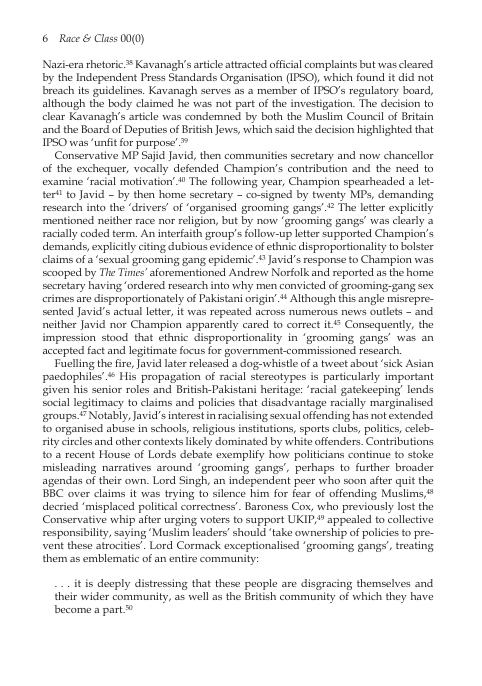
End of preview
Want to access all the pages? Upload your documents or become a member.